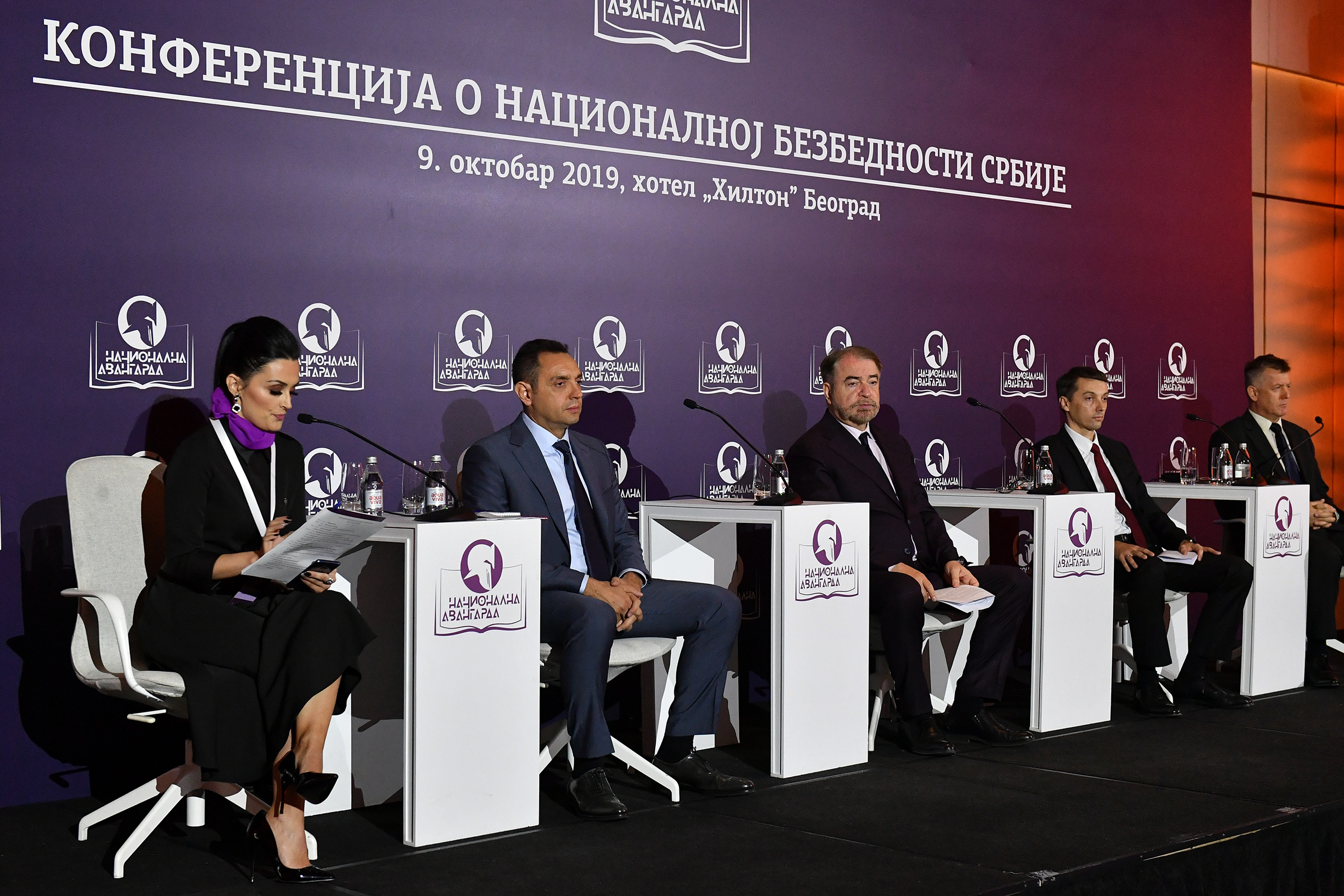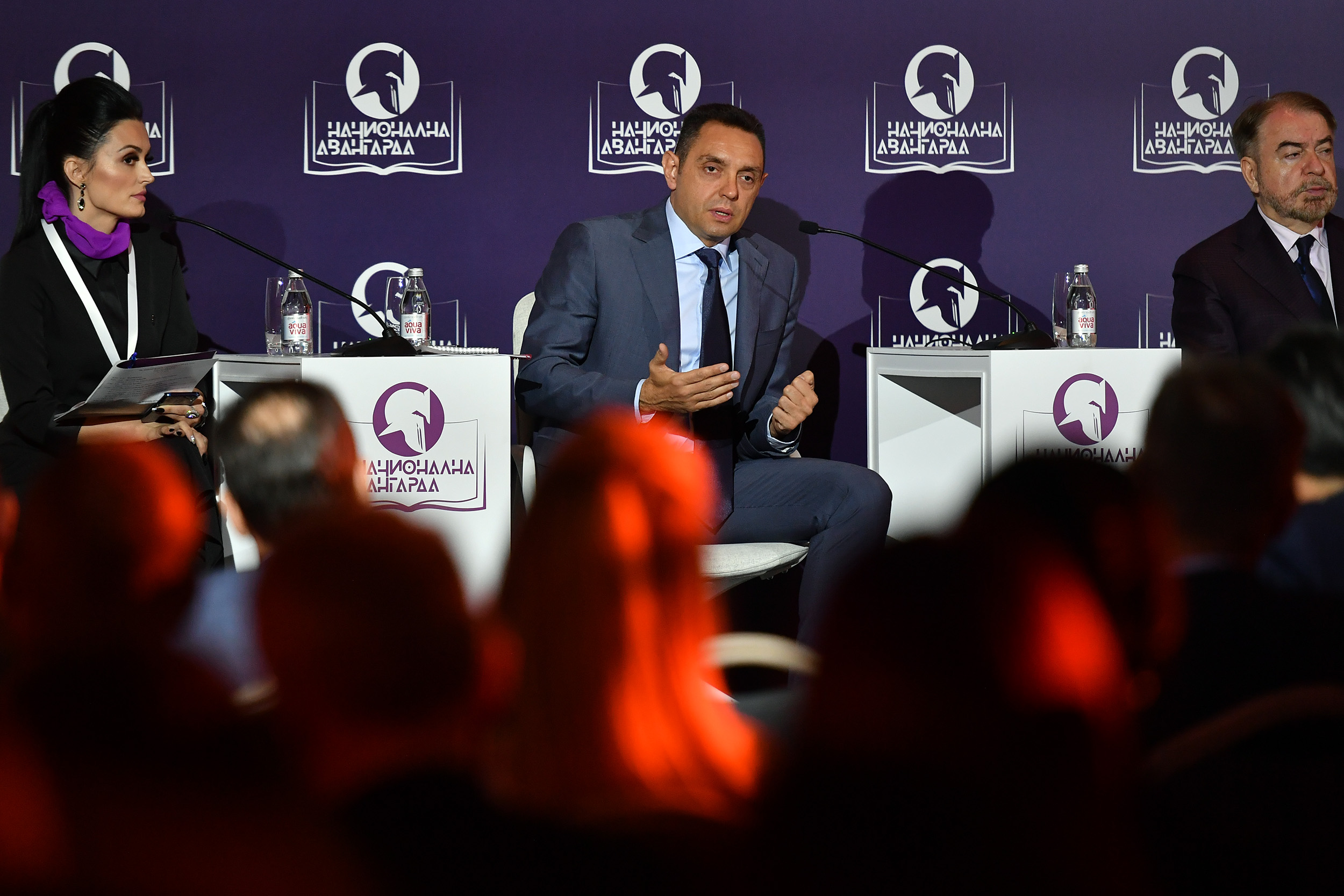09.10.2019.
Minister Vulin: The biggest security challenges – “Greater Albania” and the ideology according to which the Serbs should live only in Serbia
- The biggest security challenge for the Republic of Serbia, apart from the attempts to create a “Greater Albania”, is the ideology according to which Serbs are important only when they live in Serbia and should live only in Serbia and nowhere else; and should they live outside Serbia, they should not ask for anything, regardless of how long they have inhabited the place or how numerous they are – pointed out the Minister of Defense Aleksandar Vulin at the Conference on National Security of Serbia, held today in Belgrade and organized by the “National Avant-garde”.
 According to him, the biggest security challenge, apart from “Greater Albania”, is to reduce the Serbs to not only a demographic minority, but also a political minority, a group of people who can only talk about, possibly, themselves, their origins, sometimes organize themselves some folklore, show off the costumes from their glorious past, but not to think of or politically position themselves.
According to him, the biggest security challenge, apart from “Greater Albania”, is to reduce the Serbs to not only a demographic minority, but also a political minority, a group of people who can only talk about, possibly, themselves, their origins, sometimes organize themselves some folklore, show off the costumes from their glorious past, but not to think of or politically position themselves.- Furthermore, that they are not to have a firm, active and overt connection with their core state at any cost. The right to their own metropolis is recognized to all other nations without a problem; other nations have the right to reflect on themselves and their own decisions, and whenever Serbs attempt to do the same they are accused of the idea of Greater Serbia or aggression or preparations for an aggression – emphasized Minister Vulin.
A great security challenge for the Republic of Serbia, as the Minister of Defense pointed out, is to preserve peace and stability.
- One day ago, and I am proud of that, there were representatives of Bosnia and Herzegovina here, Mr. Dodik, Komšić, a representative of the Bosniak people, and they were greeted with applauses, with open hearts and open arms. Aleksandar Vučić went to Srebrenica and they tried to kill him. No one was held responsible for this, we were not given a single name. I am proud of the Serbian people for taking such an approach, but I cannot help but worry that no one looks back at the attempted to assassinate Aleksandar Vučić or many other things, the Serbs are the only issue. When the Serbs suffer, when wounds of the Serbs are deep, no one is touched or affected but us. And because the world is not fair, we should not whine about it, but recognize to ourselves we are wounded and cling firmly to each other – said Minister Vulin.
He stressed that Serbia is not defended only in Belgrade.
- The right of Serbs to live and endure is defended wherever they live and is defended by a powerful, economically developed, diplomatically strong, militarily strong Serbia. Without that awareness, without unity, without that awareness of the Serbs as a whole, and even the political entity, there can be no peace in the Balkans, and peace is needed and indisputably necessary - emphasized Minister Vulin.
Speaking about the national security, Minister Vulin emphasized that we cannot protect Serbia’s security by establishing borders, since the challenges that threaten our citizens will not be stopped by our border, either internally or externally, so when it comes to Serbia’s security, we must speak about the broader context.
Referring to the security challenges, the Minister of Defense emphasized that we cannot confine ourselves inside the borders of the Republic of Serbia.
- Security challenge for the Republic of Serbia is any disturbance to the way of life of the Serbs no matter where they live, an attempt to change the Dayton Agreement, to abolish Republika Srpska or any diminution of its jurisdiction or significance – it is a security challenge for the Republic of Serbia. Abolishing the possibility for Serbs to write using their own alphabet in Montenegro, to speak their own language, abolish the right of Serbs to have their church, or attempt to restore the Ustasha ideology, deny the Jasenovac genocide – these are all challenges for the Republic of Serbia – said Minister Vulin, adding that any conflict that this may result in is a security challenge for the Republic of Serbia.
 - As President Vučić said, the “Storm” and Jasenovac will never happen again, not because someone will not do it, but because Serbia will not allow it. The very idea that the new alleged election winner in Kosovo, Mr. Kurti, says that he will exercise power without legitimate representatives of Serbs, but through private Serbs, who, as we have been taught throughout history, can always be a security challenge for Serbia. How will that decision affect the quality of life of Serbs living in Kosovo and Metohija? – Minister Vulin emphasized, adding that the attempt to join the UNESCO is also a security threat and an attempt to abolish the right of Serbs to history and proof of their existence in that area.
- As President Vučić said, the “Storm” and Jasenovac will never happen again, not because someone will not do it, but because Serbia will not allow it. The very idea that the new alleged election winner in Kosovo, Mr. Kurti, says that he will exercise power without legitimate representatives of Serbs, but through private Serbs, who, as we have been taught throughout history, can always be a security challenge for Serbia. How will that decision affect the quality of life of Serbs living in Kosovo and Metohija? – Minister Vulin emphasized, adding that the attempt to join the UNESCO is also a security threat and an attempt to abolish the right of Serbs to history and proof of their existence in that area.According to him, also, when we think that denial is only a political whim and a way to win over electorate in the Republic of Croatia, we should look back and wonder – if there was no Jasenovac and if the Serbs have not been there forever, then their rebellion and their struggle are completely illegitimate?
- And then the “Storm” (“Oluja”), “Flash” (“Bljesak”) and all other utterly illegitimate politics, and they rightly expelled those who came here probably ten or 50 years ago. We, as Serbs, do not follow those traces of time, we underestimate them, because we think that everything that is not a tank and an airplane is not a security threat and that anything that is not an armed force is not a security threat – Minister Vulin emphasized, adding that stories about UNESCO and Jasenovac can threaten our way of life in Belgrade because they lead to the destruction and cleansing of Serbs from their way of life, to the limit of their very existence and survival, and then it is passed on to our lives that cannot be lived peacefully if members of our nation are suffering and hurting somewhere.
At today’s Conference, Minister Vulin opened the first panel dedicated to national security, and Professor Dragan Simeunović, Dean of the National Security Academy, retired general Slavoljub Dabić, advisor at the Serbian Ministry of Interior and Relja Željski, PhD from the Security and Information Agency, presented their assessments of the current state of regional and national security as challenges and threats that may be considered the most significant.
Conference on Serbia’s National Security was opened by the Minister of Interior, Nebojša Stefanović, PhD, that has for the second year in a row, brought together security experts from the country and abroad.




